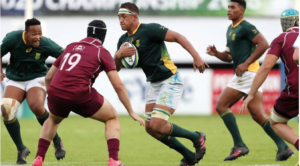In the 16th instalment of a series on black rugby legends, JOHN GOLIATH looks back at the career of former Proteas No 8 Ikraam Moerat.
Their opponents labelled them ‘dirty’, while you will never get anyone of them to admit they threw the first punch. The Moerats from the Vineyards Rugby Club in Paarl played the game hard and you would be lucky if you left the field with nothing more than a bruised ego.
But the Moerats were also a talented bunch of rugby players who dominated the SA Federation Cup in the late 1960s and early 70s, before switching allegiance to the non-racial South African Rugby Union (Saru).
It’s a rugby heritage that flows through the veins of Junior Boks captain Salmaan Moerat. Salmaan’s father, Nazeem, was one of eight family members who played for Vineyards and received Springbok colours ex post facto in 2000. His cousin Aslam Abrahams played provincial rugby for the Valke before going on to coach the Western Province and Springbok Women’s teams.
Salmaan, though, is apparently the gentle giant in this rugby-loving family. ‘Gentle’ is certainly not a word one would associate with a kid who came off the bench in Dunedin for his Stormers debut earlier this year and made an impression with his physicality, which included some big hits and strong runs. But apparently it’s true …
‘The Moerats were known for their aggressive style of play and I think he displays that on the field. But his calm demeanour off the field is probably from one of his grandmothers,’ says his father’s cousin Ikraam Moera jocularly. He is also one of the family’s pioneers on the rugby field who played on both sides of rugby’s political divide in the turbulent 1970s and ’80s.
Salmaan led the South African team at the World Rugby U20 Championship in France in May and June. It was his second appearance at the event, after making his debut for the Junior Boks in 2017.
‘Salmaan was always a big boy, more than twice the size of the other boys in his age group,’ says Ikraam. ‘We are very proud of him, and it makes me smile when you read in the newspapers and magazines that he is being spoken about as a future Springbok captain.’

this year’s World Rugby U20 Championship
For Ikraam, though, seeing Salmaan carrying on the family’s rugby tradition doesn’t mean as much as the opportunity that the big lock is being given to prove himself against the best.
Ikraam certainly wishes he and his brother Marwaan could have tested themselves against all rugby players in South Africa. Unfortunately, though, they only got a taste playing in the Federation stable, which saw them play in ‘a few mixed games, as the apartheid government were desperate to avoid sanctions and wanted to get out of isolation’.
Ikraam was a tough-as-nails No 8, who also had a lot of speed and great hands. Many considered him in his prime in the ’70s as one of the best loose forwards in the country, but he had only limited opportunities to prove himself against his white counterparts.
‘During the time when the world started to boycott South African sport, the government was under pressure and it started to organise club games between mixed teams,’ Moerat says. ‘I remember the first mixed club game in South Africa. A combined Paarl team played against Villagers from Cape Town, who had just won the South African national club championships in 1980.
‘We had never played against white players or white clubs before, and everyone kept saying we were going to lose 100-0. We didn’t know what to expect. “Are we really going to lose 100-0?” we kept asking ourselves.
‘We eventually played to a draw, and it was an eye-opener. For the first time I realised coloured players were just as good as the white players. As players we often heard our supporters say we were better than the guys playing for the Springboks, but we never believed it. It was different after that, though.’
But playing under the banner of the Federation was something that divided opinions about Moerat, who was hailed a hero by some and a sell-out by others.
Moerat played more than a dozen games for the Proteas, the representative team of the Federation, alongside players such as Errol Tobias. But he withdrew from a 1972 tour match against England in protest against what was happening in the country at the time.
‘In Paarl there were two bodies, which was different to many of the other towns,’ he says. ‘On the one side was the Federation that played with the whites, while Saru believed we couldn’t play together because of apartheid and what was going on in the country.
‘It’s why I withdrew from the Proteas game against England, but I eventually went back to playing under the Federation banner because I wanted to play for Vineyards, with my family.
‘But a few years later I joined Schotschekloof RFC in Cape Town, who played under the Saru banner. I then made the Western Province team, but when Vineyards moved over to Saru I went back to Paarl and eventually also played for Boland.’
Moerat played over 50 matches for Western Province and Boland, but never got Saru colours, ‘as I was past my prime as a rugby player’.
However, that hole in his heart is being filled by Salmaan, who is slowly but surely following in his uncle’s footsteps.
– This article first appeared in the July 2018 issue of SA Rugby magazine





